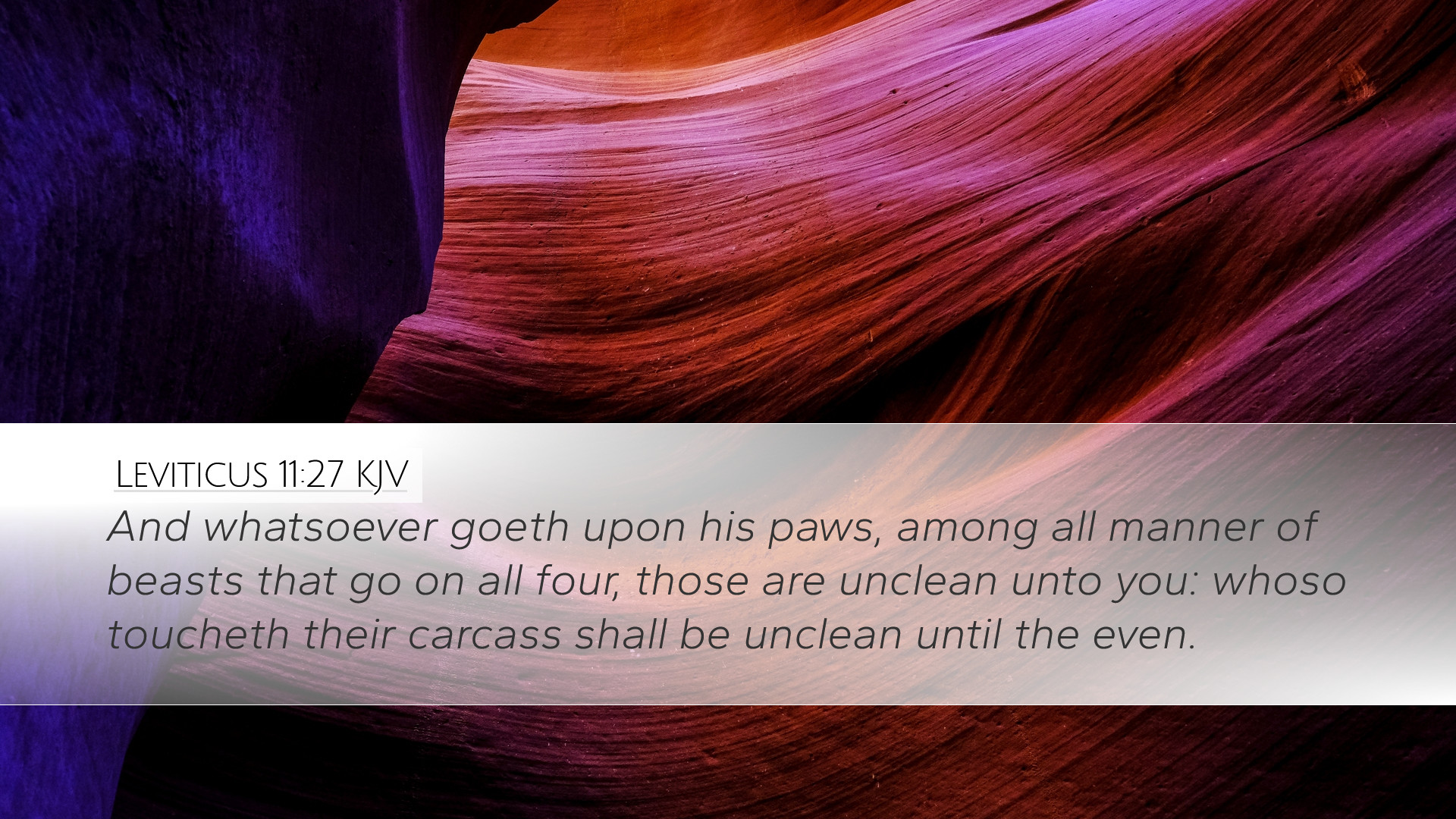Commentary on Leviticus 11:27
Bible Verse: “And whatsoever goeth upon his paws, among all manner of beasts that go on all fours, those are unclean unto you: whoso toucheth their carcass shall be unclean until the even.”
Introduction
Leviticus 11 contains God’s laws regarding clean and unclean animals, serving a dual purpose: to establish holiness among the Israelites and to define a distinct identity. This specific verse, Leviticus 11:27, pertains to creatures that move on their paws, elucidating God’s intentions for Israel’s dietary laws and communal purity.
Textual Analysis
1. Definition of Unclean Animals: The phrase "goeth upon his paws" refers to animals that are typically quadrupedal. The Mosaic law outlines a framework that distinguishes certain animals as unclean, reflecting God's systemic view of holiness and purity. Both the physical characteristics of these animals and their symbolism play crucial roles in defining their status.
2. Cleanliness and Holiness: The laws regarding clean and unclean animals are intricately tied to the broader theme of holiness in Leviticus. God emphasizes that contact with the unclean renders one ceremonially impure, thus necessitating ritual cleansing. This notion reinforces the call for the Israelites to separate themselves from anything that may defile their community and worship.
Commentary Insights
Matthew Henry
Matthew Henry notes that these dietary restrictions are not arbitrary but serve to instruct the Israelites about living in obedience to God. He emphasizes that understanding which animals are clean or unclean enables the community to maintain a sense of purity. Henry posits that the focus on paws may symbolize a deeper moral and spiritual condition, teaching believers principles of obedience and separateness.
Albert Barnes
Albert Barnes elaborates on the importance of these distinctions in the life of Israel. He suggests that the laws were designed to promote health, spiritual discipline, and a sense of divine order. The prohibition of touching the carcass of an unclean animal highlights the seriousness with which God treated matters of purity. Barnes expounds upon the spiritual implications of these laws, noting that they foreshadow the greater cleanliness required in the New Covenant.
Adam Clarke
Adam Clarke provides a scholarly examination of the text, suggesting that these guidelines served practical purposes in ancient Israel, particularly in the context of disease and hygiene. Clarke views the classification of unclean animals as a safeguard against practices that could endanger the community’s health. Furthermore, he connects the physical practices to spiritual principles, advocating that the believer’s ongoing separation from sin mirrors the laws governing animal consumption. He emphasizes that this verse indirectly speaks to the notion of contact with sin and the need for spiritual vigilance.
Theological Implications
The implications of Leviticus 11:27 reach far beyond dietary laws; they reflect God's desire for His people to embody holiness in every aspect of life. This divine directive serves as an important theological foundation illustrating the nature of God as holy and separate from impurity.
1. Holiness and Separation: The concept of holiness propounded in Leviticus is interwoven with the Christian understanding of moral and ethical separation from sin. The New Testament reiterates this call for holiness, urging believers to avoid practices that defile their spiritual lives.
2. Symbolism of Clean and Unclean: The division of clean and unclean denotes more than dietary recommendations; it symbolizes the necessity of internal purity. Just as the Israelites were called to abstain from unclean creatures, believers today are called to turn away from sin and corruption.
Practical Applications for Today
-
Awareness of Spiritual Defilement: Just as touching carcasses made one unclean, believers must be mindful of the influences and environments that contaminate their spiritual condition.
-
Community Responsibility: The laws served the community’s health and spiritual welfare. Pastors and church leaders should be aware of how church environments and practices influence congregational holiness.
-
Teachings on Obedience: Emphasizing obedience to God’s commandments remains vital. Just as the Israelites were called to follow dietary laws, modern believers are encouraged to adhere to scriptural guidance for a holistic life.
-
Spiritual Vigilance: The inherent call for vigilance against sin parallels the Israelites’ need for carefulness regarding unclean animals. Believers are encouraged to remain discerning and holy in their interactions with the world.
Conclusion
The commentary on Leviticus 11:27 reveals the profundity of God’s laws not merely as regulations but as avenues for understanding holiness, community, and the personal discipline required of those who follow Him. For pastors, students, and theologians, this verse underscores the eternal relevance of God’s intentions for purity, urging a reflection on the larger spiritual themes present within the Mosaic Law and their application in contemporary faith. Ultimately, Leviticus 11:27 stands as a reminder of the need for a holistic approach to holiness encompassing both practical and spiritual dimensions in the life of faith.


